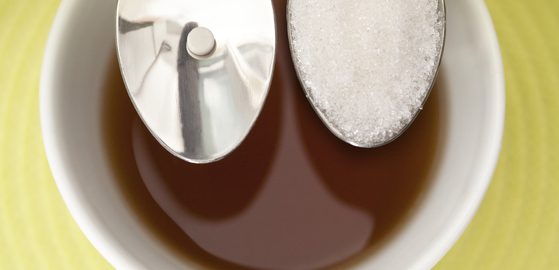
Know Your – Sugar Substitutes
Natural and artificial sugar substitutes – Good or Bad?
If you’re here, it’s probably because you either want to kick sugar from your diet, or you have kicked sugar from your diet and want to know more about the sugar substitutes in your food. It can be overwhelming to hear words like Xylitol and Erythritol, but we’re here to simplify the differences so you know what’s right for you!
In this article, we’re breaking down the top 5 popular sugar replacements, what foods they’re in, a touch of science behind them, how your body may respond, and where to get started. In this day and age, we have so many different artificial and natural sweeteners, and it can be really hard to tell how your body will respond. Some of these sweeteners may sound frightening, but remember, we’re here for the healthy alternatives! Without further ado, here are your top 5 sugar substitutes and how they work.
Monk Fruit
The Monk Fruit, also known as lo han guo, is a small sweet melon native to Southeast Asia. It has been used for centuries for medicinal purposes and has now made its way into Western markets as a zero-calorie sugar substitute.
Monk fruit extract alone is 150-200 times sweeter than sugar, so it is often combined with other common approved ingredients, such as erythritol, to make it suitable for use in food and beverages. Monk fruit sweeteners are also stable at high temperatures, making them perfect for use in baked goods. However, foods made with monk fruit sweeteners may have some slight differences in appearance, texture and taste than foods made with sugar. There are no known negative side effects of monk fruit.
Replacing sugar with monk fruit can help people with diabetes and/or people who are avoiding sugar to find good foods and take a step in the right direction towards weight loss goals. One thing to be sure of when consuming low-calorie substitutes to reduce overall caloric intake is to avoid additional caloric compensation from other foods. At The Low Carb Grocery, we carry these granular monk fruit sweeteners and these monk fruit foods & drops.
Stevia
When you’re watching your blood sugar levels, there’s a chance you’ve tried stevia, or at least you’ve heard of it. Stevia is a miraculous plant, but there are some things we have to consider with it, and some of its newer research. There are a lot of benefits with stevia, but we have to address a couple of cons too.
Stevia gets the green checkmark, right out the gate, so don’t worry about any big curveballs. However, Stevia might produce a little bit of insulin. It’s not anything super significant, but it’s still something to be cognizant of with the research that’s available right now.
One of the great benefits of stevia is that it does increase sodium excretion. Sodium excretion is the process of eliminating or expelling waste matter in your cells. So, if you’re feeling puffy, or if you’re holding a lot of water, a little bit of stevia can encourage the kidneys to expel sodium causing you to drop that extra water weight. Stevia has some powerful effects! At The Low Carb Grocery, we carry these granular stevia sweeteners and these stevia foods, candies, chocolates & drops.
Xylitol
Despite probably the most difficult name on this list, Xylitol may be one of the simpler sweeteners to breakdown. However, before we break down its benefits for humans – we must address that xylitol is fatal in dogs (like chocolate). If you buy anything xylitol, it’s okay for you and children, but be sure to keep it on a top shelf or locked in a cabinet in your kitchen so your dog doesn’t get to it!
A really good source of xylitol will come from birch bark. When you’re shopping for this sweetener, you want to make sure that it’s organic and non-GMO. There’s no aftertaste with Xylitol, which is a great benefit, and it tastes very similar to sugar. Xylitol can also be found in nasal sprays because it helps bacteria break from the wall of your mucous membranes, which clears out microbes (bacteria).
Another large benefit of Xylitol is that it can reduce tooth decay. Its glycemic index is around 7, which means Xylitol can affect blood sugars, but only in great quantities around 65g or more. It can be purchased at The Low Carb Grocery in these Xylitol granular sweeteners and Xylitol chewing gum.
Erythritol
Erythritol is a sugar alcohol, meaning that it won’t count towards net carbs – if you’re counting. Sugar alcohols are commonly confused with artificial sweeteners; however, they are not the same. Artificial sweeteners can have several health risks and also leave a bad aftertaste. In comparison, sugar alcohols are much safer.
Sugar alcohols are neither sugar nor alcohol. They are not absorbed by the body like other carbohydrates and they will not contribute to weight gain. Common side effects of consuming a large amount of sugar alcohol (more than 18g) may include bloating, gas and possible laxative effects. However, erythritol is often better tolerated than other sugar alcohols.
Erythritol is about 70% as sweet as table sugar and produces a slight “cooling” effect, similar to the effects of mint flavours. This occurs through an endothermic reaction, in which erythritol essentially absorbs the heat from your mouth.
Erythritol is made by fermenting natural sugars found in certain fruits and vegetables. Corn is commonly used; however, watermelon, pears and soy sauce also contain the same natural sugars.
Erythritol is specifically designed to replace sugar and bakes in a way that is almost identical to sugar. However, erythritol may be used in combination with other ingredients due to its sugar-like properties, so it is always best to check the ingredients list for any harmful artificial sweeteners.
Inulin
Inulin is a soluble, prebiotic fibre that is found in many fruits, vegetables and herbs, as well as in manufactured forms. Although it is not digested or absorbed in the stomach, consuming inulin can provide many health benefits. Some common sources of inulin are in asparagus, garlic, onions, and chicory root.
When consumed, inulin travels to the bowels where good bacteria use it as a food source to grow. These bacteria help convert the inulin into short-chain fatty acids, which provide various health benefits and can also aid in weight loss. Short-chain fatty acids are the main source of nutrients for your colon cells and are also involved in the metabolism of carbs and fat. High-performance (HP) inulin may also provide benefits for those with diabetes and prediabetes by reducing blood sugar levels.
Note that inulin is a “fructan,” meaning that its chemical structure is made of fructose molecules that are linked together in a way that cannot be digested. We are hesitant when we see “fructose” on an ingredient list, but if you see the term “oligofructose” on a label, this simply indicates a manufactured form of inulin. At high doses (more than 30g) some may experience side effects of inulin including bloating, gas, laxative effects, constipation and cramps.
Bonus 3: Sucralose, Isomalt & Maltitol
Sucralose, also known as Splenda, is one of the most common sweeteners to use on a keto diet. There is some controversy with sucralose because it’s an artificial sweetener and is kind of in a grey area, so we have to break some things down a little bit.
Sucralose is not as simple as it seems because if you get a packet of sucralose or a packet of Splenda, it usually has maltodextrin added to it. The maltodextrin can trigger an insulin response, therefore if you’re commonly using sucralose via the small packets, then you’re probably triggering an insulin response and kicking yourself out of keto and potentially harmful for diabetics. Sucralose in packets should be avoided.
If you buy sucralose that’s in a product; be aware that it isn’t that good for you, but it shouldn’t kick you out of keto if it doesn’t have the maltodextrin attached to it. The main point to mention with sucralose is to just be careful with it.
Isomalt and maltitol are commonly found in diabetic candies and sometimes in no-sugar-added chocolates. You could go as far as saying isomalt and maltitol are keto- and diabetic-friendly, but these sweeteners are a little disreputable because these sugar alcohols can trigger an insulin response. You don’t need to avoid them entirely, although they may make you feel a little bloated and trigger possible laxative effects, but it’s usually printed on the candy’s packaging.
What do you think?
This is our breakdown of the most popular sugar substitutes. Monk fruit can help diabetics find good foods and be a step in the right direction towards your weight loss goals. Stevia gets the green checkmark and can encourage your kidneys to expel sodium to drop some extra water weight. A good source of Xylitol comes from birch bark and can commonly be found in nasal sprays to remove bad bacteria. Erythritol is well known for its cooling effect, like mint, and is commonly found in combination with other sweeteners to make the perfect cup for cup measure with sugar. Inulin provides various health benefits and can also aid in weight loss. And the bonus substitutes, sucralose, maltitol, and isomalt, are technically keto- and diabetic-friendly, but you should steer clear or at least be careful with these when possible.
Shop all our sugar substitutes here and try the few that best match your needs! Do you agree with our list? Did we miss anything? Share your sugar substitute choices and experiences by letting us know in-store or on Facebook or Instagram.






